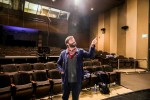Poor Dog Group will participate in therapy on stage as part of their latest show, “Group Therapy.”
The contemporary LA-based theater ensemble will premiere its latest show Thursday at UCLA’s Little Theater until Jan. 13. The show features the ensemble members re-enacting moments from 16 hours worth of group therapy sessions, which they underwent due to interpersonal conflicts within the group.
Since Poor Dog Group’s inception in 2008, the tight-knit group’s members have performed several theatrical works together. However, working together for a decade created personal and group problems, including alcoholism and fighting, said founding member and “Group Therapy” director Jesse Bonnell. After the ensemble performed its previous show “Five Small Fires” in 2014, many of the performers felt burnt out, resulting in a general period of tension, said Andrew Gilbert, another founding member of the ensemble and the sound designer for “Group Therapy.”
“If this is it, if this was the end of our company, how do we save the company? How do we fix our shows and each other?” Gilbert said. “‘Group Therapy’ was the answer – we needed to sit and talk to each other.”
Spurred by the deteriorating relationships between ensemble members and “Journey into Self,” a film about therapy in a group setting, Gilbert said Poor Dog Group turned to group therapy for a solution. After finishing the sessions and transcribing each meeting, the company began creating a theater piece based on its experiences, Bonnell said.
“It seems like killing two birds with one stone,” said Cat Ahmanson, a third founding member of Poor Dog Group and a performer in the show. “We can make a really interesting and engaging piece of theater while also opening some of the wounds that have been inflicted over the years.”
“Group Therapy” features members of the ensemble listening to and reading their own lines from the original transcripts of their group therapy sessions. Recordings were made of their 2015 therapy sessions, which evolved into scripts for readings. Then, recordings were made of future unlicensed sessions and group and personal reflections, which were combined into a larger collection of recordings and scripts that make up their upcoming show.
“In practice, what has happened to the work itself is that it becomes a kind of feedback loop,” Bonnell said. “In a strong way, the piece is about our present selves looking back at our past selves and having to confront those realities.”
The readings are followed by curated, theatrical performances that expand and emphasize certain emotions or experiences from the readings. In some of the performances, members recreate actual moments from the 2015 therapy sessions, which may involve them standing, sitting or moving their hands.
“There are different sections that have been manipulated either through technical elements or performative elements that we use to heighten the emotion and experience and the dilation of how long we’ve been doing this,” Ahmanson said.
Bonnell said even now, after three years of constantly refashioning the transcripts, the emotional responses vary after each reading. Sometimes the members become indifferent to the material, while other times they struggle to even finish reading the scripts.
“(It’s) painful to relive past trauma and tense moments of emotional confrontation in therapy with your best friends and family, and that’s what we’re doing in the show,” Bonnell said. “Imagine reliving that over and over again.”
Although “Group Therapy” has challenged the members to share their unspoken feelings and helped them communicate with each other better, the members of the group still do not know if the theater company will move forward from its issues and survive, Bonnell said.
Though the show focuses on the specific interactions between members of Poor Dog Group, Bonnell said its themes are universal, whether they be in terms of love, finances or communication. Ahmanson also said she hopes the audience members will focus on the importance of relationships and learn that maintaining them may not be an easy process.
“I hope people can … be inspired to continue to foster their relationships with love and understanding,” Ahmanson said. “It’s hard; it’s not easy, and that’s OK.”
